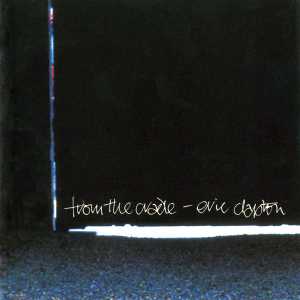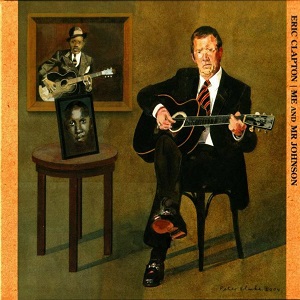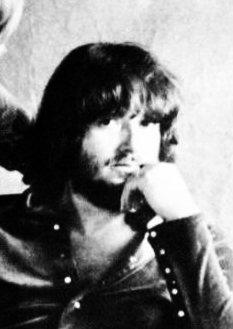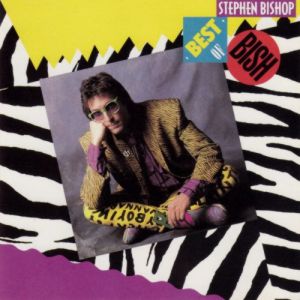
August is the tenth solo studio album by Eric Clapton, released in 1986 by Duck Records/Warner Bros. Records. Described as a "hard R&B" album, it was primarily produced by Phil Collins, in association with longtime Clapton associate Tom Dowd.

From the Cradle is the twelfth solo studio album by Eric Clapton, released on 12 September 1994 by Warner Bros. Records. A blues cover album and Clapton's follow-up to his successful 1992 live album, Unplugged, it is his only UK number-one album to date.

"Layla" is a song written by Eric Clapton and Jim Gordon, originally recorded with their band Derek and the Dominos, as the thirteenth track from their only studio album, Layla and Other Assorted Love Songs (1970). Its contrasting movements were composed separately by Clapton and Gordon. The piano part has also been controversially credited to Rita Coolidge, Gordon's girlfriend at the time.

Me and Mr. Johnson is the fifteenth solo studio album recorded by Eric Clapton, released in March 2004 by Reprise Records. It consists of covers of songs written and originally recorded by Robert Johnson. The album cover was painted by Sir Peter Blake, using a series of photographs of Clapton. Clapton had planned to record an album of new material, but by the time of the recording sessions there were not enough new songs written, so the band instead recorded a series of Johnson songs.

Behind the Sun is the ninth solo studio album by Eric Clapton, released on 11 March 1985 by Duck Records / Warner Bros. Records. It is Clapton's first collaborative project with Phil Collins who co-produced the album and played on some of the tracks. While recording the album Clapton temporarily split with his wife.

"After Midnight" is a rock song by J. J. Cale, first released in 1966. Eric Clapton later covered it for his eponymous album, released in 1970. Clapton's rendition became a success, prompting Cale to re-record the song for his own 1971 album Naturally. In 1987, Clapton later re-recorded the song for a Michelob beer commercial and then released the re-recording as a single. "After Midnight" has been considered one of Clapton's signature songs throughout his career. Other artists covered the song in later years.
"Love Can Build a Bridge" is a song written by Naomi Judd, Paul Overstreet, and John Barlow Jarvis, and recorded by American country music duo the Judds. It was released in 1990 as the second single and title track from their album of the same name. It was a top-five country hit in mid-1991. The song has inspired several cover versions, including one by Cher, Chrissie Hynde, Neneh Cherry, and Eric Clapton that topped the UK Singles Chart in 1995.

"Change the World" is a song written by Tommy Sims, Gordon Kennedy, and Wayne Kirkpatrick and recorded by country music artist Wynonna Judd. A later version was recorded by English singer Eric Clapton for the soundtrack of the 1996 film Phenomenon. Clapton's version was produced by R&B record producer Kenneth "Babyface" Edmonds.

Ultimate! is a comprehensive career retrospective album by English rock group the Yardbirds. The 52-song two–compact disc compilation was released in 2001 by Rhino Records. The tracks span the period from the group's first demo recordings in 1963 to the last singles in 1968. They include all 17 of the group's singles, both A-side and B-sides, supplemented with more than a dozen album tracks, their performance for the film Blow-Up, and three early solo numbers by singer Keith Relf.

"I Wish It Would Rain Down" is a song by English musician Phil Collins from his fourth solo studio album, ...But Seriously (1989). The song was a chart success in early 1990, peaking at No. 7 on the UK Singles Chart, No. 3 on the US Billboard Hot 100 and No. 1 on the Canadian RPM 100 Singles chart; in the latter country, it was the most successful song of 1990. Collins felt that it was as close as he had ever got, at the time, to writing a blues song.

"Bad Love" is a song recorded by English singer and guitarist Eric Clapton, who co-wrote it with Foreigner's lead guitarist Mick Jones. The track was released in the UK in January 1990 as the first single from Clapton's 1989 studio album Journeyman.

Delaine Alvin "Delaney" Bramlett was an American singer and guitarist. He was best known for his musical partnership with his wife Bonnie Bramlett in the band Delaney & Bonnie and Friends, which included a wide variety of other musicians, many of whom were successful in other contexts.

"Key to the Highway" is a blues standard that has been performed and recorded by several blues and other artists. Blues pianist Charlie Segar first recorded the song in 1940. Jazz Gillum and Big Bill Broonzy followed with recordings in 1940 and 1941, using an arrangement that has become the standard.

Careless is the debut album by singer/songwriter Stephen Bishop. It includes two hit singles: "On and On", which peaked at No. 11 on the Billboard singles chart, and "Save It for a Rainy Day" which made No. 22. The album itself rose to No. 34 on the Billboard albums chart. Notable contributors to the album include Eric Clapton, Art Garfunkel and Chaka Khan.

"Let It Rain" is a song and single written and released by the British rock musician Eric Clapton and Bonnie Bramlett; it appears on his 1970 debut studio album Eric Clapton. In 1972 it was released as a single as part of the promotion for his compilation album Eric Clapton at His Best

"Blue Eyes Blue" is a pop song written by American songwriter Diane Warren. The tune was written for the 1999 soundtrack of Runaway Bride. The British rock musician Eric Clapton recorded the song for the soundtrack and released his performance of the song as a single on July 20, 1999, for Reprise Records.

Bish is the second album by singer/songwriter Stephen Bishop. The lead single, "Everybody Needs Love", peaked at No. 32 on the Billboard Hot 100 singles chart. and number five on the U.S. Adult Contemporary chart. It did better in Canada, reaching No. 29 and peaking at number two on the Canadian Adult Contemporary chart. The album itself rose to No. 35 on the Billboard pop albums chart.

Red Cab to Manhattan is the third album by singer/songwriter Stephen Bishop and his first for Warner Bros. Unlike his previous two albums, Careless and Bish, none of its tracks nor the album itself cracked the top 100 on the Billboard singles or albums charts. Like his previous albums, Bishop had some big names help on the album. Notable contributors include Eric Clapton, Phil Collins and Art Garfunkel.

Best of Bish is the first compilation album by singer/songwriter Stephen Bishop. It was released by Rhino Records in 1988.
"Born in Time" is a rock song written by American singer-songwriter Bob Dylan, who first released the track on September 10, 1990, on his twenty-seventh studio album Under the Red Sky. It is a reworking of a song originally recorded at the previous year's Oh Mercy sessions. The British recording artist Eric Clapton covered the song for his 1998 studio effort Pilgrim and released his take on the tune as a single. The song has been praised by critics for its catchy melody and romantic, dreamlike lyrics.


















